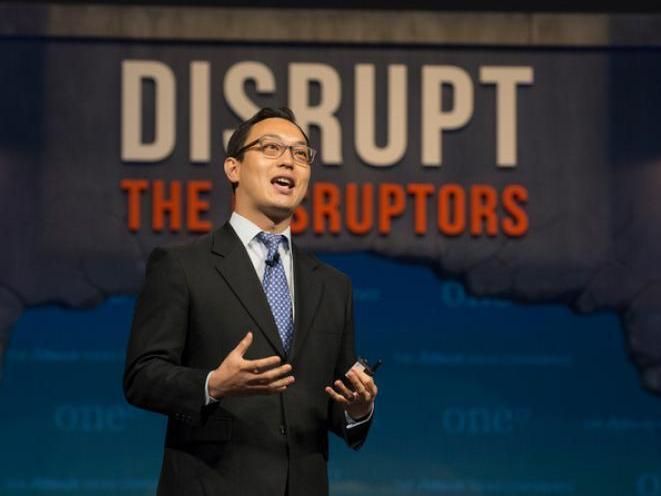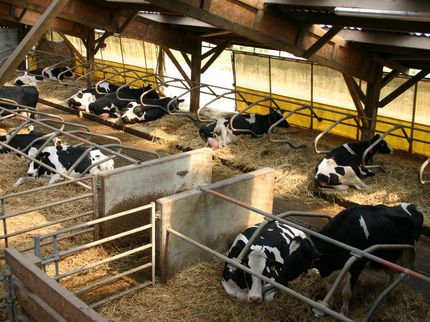10 agri-tech disruptions that could shape the future of farming and food
Advertisement
“It turns out that in agriculture, we have some big problems we’re trying to solve, and we have some people with technologies that could really help us,” explained Aidan Connolly, chief innovation officer at Alltech. “But we really have to help them to help us.”
With the population steadily rising, it is important to find sustainable ways to nourish the masses. At ONE: The Alltech Ideas Conference (ONE17), 10 ready-for-market companies took the stage by telling a crowd of 4,000 potential investors and business partners what their plans are to disrupt the industry.

alltech
How can these companies change the way we farm and the way we eat?
Agrilyst: Determined to help indoor farmers save money and increase yields through data collection, Agrilyst aims to be an at-home digital agronomist pushing farmers to achieve year-round revenue.
AgriWebb: Optimizing farm efficiency and looking to solve a $25 billion issue in agriculture, AgriWebb supports farmers by tracking their data and accreditation needs.
“I wanted to solve real problems for real people,” Kevin Baum, co-founder and CEO of AgriWebb, told the crowd.
Alesca Life: As a company that allows commercial-scale farming anywhere, Alesca Life saves water, promotes urban farming and meets the demand of fresh produce and organic food. Because farms are available in a shipping container, Alesca Life CEO Stuart Oda said that his company provides “local food production by anyone, anywhere.”
eFishery: Overfeeding at shrimp and fish farms is a big issue in aquaculture, especially when 80% of the total cost at farms is feed. eFishery senses a fish’s appetite, adjusts the amount of feed needed and automatically distributes it to reduce a farmer’s cost by up to 21%.
Greengage: When light can affect a chicken’s physiology, behavior and productivity, farmers should look to Greengage for a solution. Their LED lights that can last 60,000 hours can reduce mortality rates, increase yields and lead to more productive chickens.
Hargol FoodTech: As the world’s first commercial grasshopper farm, Hargol FoodTech is disrupting the industry by proposing a new, sustainable grasshopper protein. With 72% protein, essential amino acids and a neutral taste, it has the potential to become a power protein player in providing solutions to our world’s future food crisis.
MagGrow: An astounding 70% of what is sprayed does not reach the target crop, and as the CEO of MagGrow, Gary Wickham, said, “It’s waste,” particularly when 80% of the world’s available water is being used for agriculture. By using a magnetic spraying system, MagGrow disrupts the status quo by reducing water drift by over 80%. It is “truly using less to grow more, and that’s what the world needs,” explained Wickham.
Moocall: Using calving sensors to measure contractions, Moocall can predict when a cow is going into labor. This innovative device will text and email a farmer an hour before the cow gives birth, marginalizing the $2 billion loss farmers experience per year due to cow and calf death during birth.
SkySquirrel: Utilizing the disruptive technology of drones, SkySquirrel has created a technology used for monitoring crop health. This invention can save the wine industry $15 billion per year by detecting diseases in the vineyard.
Tevatronic: “What do you think will happen with a system that will decide for you?” Oleg Koral, Tevatronics CEO, asked the crowd. The company, which is revolutionizing the future of irrigation, has developed an autonomous system that knows when to start and stop irrigation on crops so they receive just the right amount of water at the right time. The culmination of a 15-week program called The Pearse Lyons Accelerator, the 10 companies (which were chosen out of almost 200 applicants) have been provided with mentorship and new industry connections. They also received over €300,000 in software perks from Google, Amazon and Softlayer.
“Since starting The Pearse Lyons Accelerator 100 days ago, we have doubled our revenue,” Agrilyst CEO Allison Kopf enthusiastically told the crowd.
Connolly, one of the mentors of The Pearse Lyons Accelerator program, gave future and current entrepreneurs a piece of advice before ending the session.
“You have to be passionate about what you do, but the focus is absolutely critical,” he said. “The business is not going to come to you; you have to go and find the business.”
One thing is clear: with disruptive ideas from around the world and a growing interest by investors in agriculture, a sustainable future seems more possible than ever before.




























































